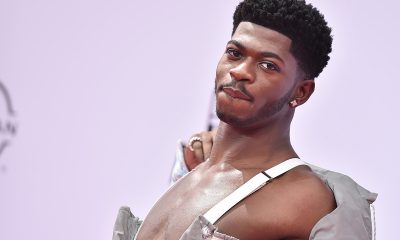Arts & Entertainment
Top 10 pop culture moments of 2021
A gay Playboy cover boy, a Satanic lap dance, the ‘Pose’ finale, and Colton’s drama
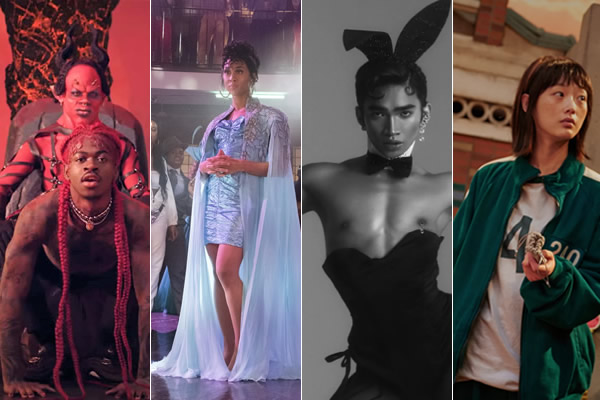
It was a memorable year for pop culture, as productions resumed after COVID lockdowns. Here’s our list of the top 10 pop culture moments of 2021.
#10: Lesbian nuns get it on in ‘Benedetta’
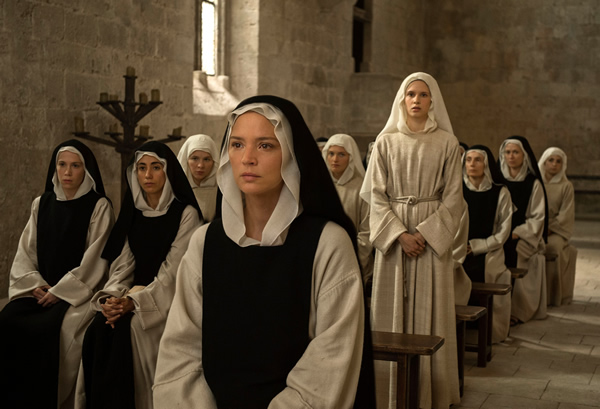
Director Paul Verhoeven (“Basic Instinct,” “Showgirls”) delivered his latest film “Benedetta,” which tells of an Italian nun in the 1600s who receives erotic visions of a nude Christ as well as stigmata before having a lesbian relationship with a novitiate in her convent.
The title character (played by Virginie Efira) plays “a randy nun whose religious visions and lustful cravings are rolled into a single ball of blasphemy,” as the New York Times wrote. “Verhoeven might have aged, but his love of the lurid has dimmed not one bit.”
The Times also said the movie “presents lesbianism as a middle finger to church power.”
A modest release, it gained steam on the festival circuit and screened in competition at Cannes.
#9: Sapphic love in ‘Squid Game’
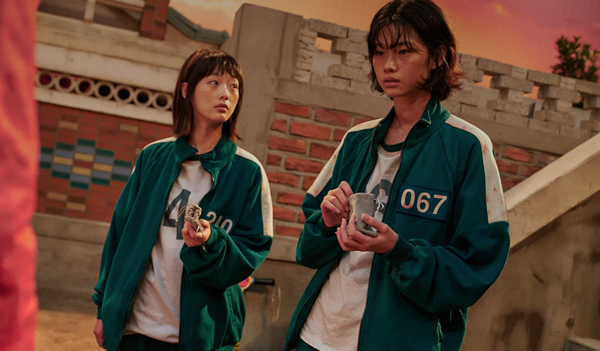
(SPOILER ALERT) It was subtle but the relationship between players 067 (HoYeon Jung) and 240 (Lee Yoo-mi) on the “Gganbu” episode of “Squid Game,” Netflix’s monster K-drama, was embraced by fans as a tale of doomed lesbian love.
While other teams use the 30 minutes allotted for a nerve-wracking series of marble games, the two young women spent all but the final seconds of their time telling each other their life stories. Player 240 loses intentionally, sacrificing her life for her partner’s. She expresses her love just before getting shot.
The show has been deemed Netflix’s “most watched series.”
#8: Olly’s big year
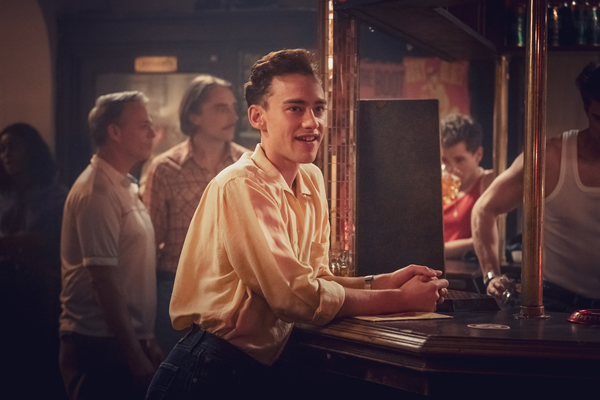
It was a big year for Olly Alexander, the Years & Years singer. He drew raves for his role in the five-part British series “It’s a Sin” as Ritchie, one of a group of gay U.K. men dealing with AIDS in the ‘80s.
In March, Alexander announced that his band was now a solo venture. Kylie Minogue showed up as guest artist on a remix of single “Starstruck” in May. In October, Years & Years guested on Minogue’s song “A Second to Midnight.” A full album is expected in 2022.
Alexander performed a sensuous cover of the Pet Shop Boys’ “It’s a Sin” with Elton John at the BRIT Awards in May.
#7: Bretman dons bunny ears
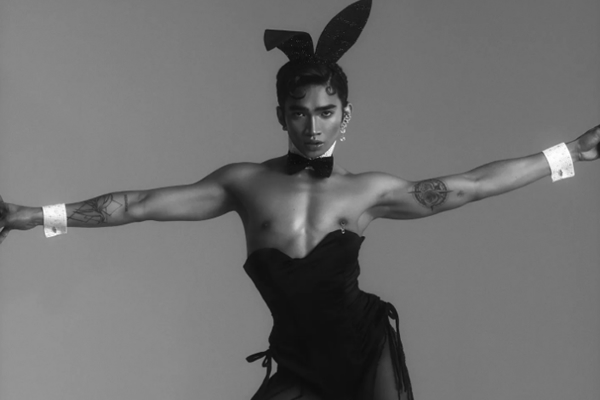
Bretman Rock, the 23-year-old Filipino YouTuber and beauty influencer known for his makeup tutorials and MTV reality show, made history as the first openly gay man to make the cover of Playboy magazine.
Aside from Playboy’s late founder, Hugh Hefner, Rock is only the second man to appear on the cover (in July, 2020, Puerto Rican rapper Bad Bunny was the first).
Sporting a nipple-baring bustier and the famous bunny ears, Rock called the historic moment “so surreal” on Instagram. Sadly, the issue is digital only as Playboy suspended its print product in 2020 after 66 years citing COVID “disruption.”
Model Ariel Nicholson became the first trans person on the cover of Vogue in September. She was featured with seven other models dubbed “Generation America.”
#6: Ewan bends over for ‘Halston’
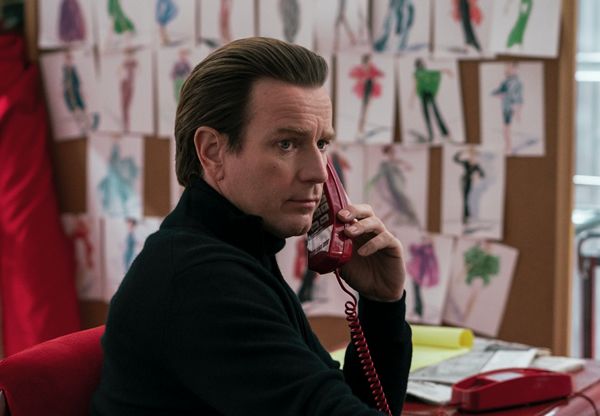
Straight actor Ewan McGregor drew strong reviews for his portrayal of late gay designer Roy Halston Frowick (who died of AIDS in 1990) in the Netflix miniseries “Halston,” which premiered in May.
Another Ryan Murphy-produced project, “Halston’s” five episodes follow the designer’s work with Liza Minnelli, booming business, drug use and comeback.
McGregor, no stranger to screen sex scenes and nudity (he even filmed one with Jim Carrey in “I Love You Phillip Morris”), gets pounded by soon-to-be-boyfriend Ed (Sullivan Jones) in the first episode, though ultimately, the series focuses more on drugs than sex. He won an Emmy for the role in September.
#5: ‘Pose’ wraps
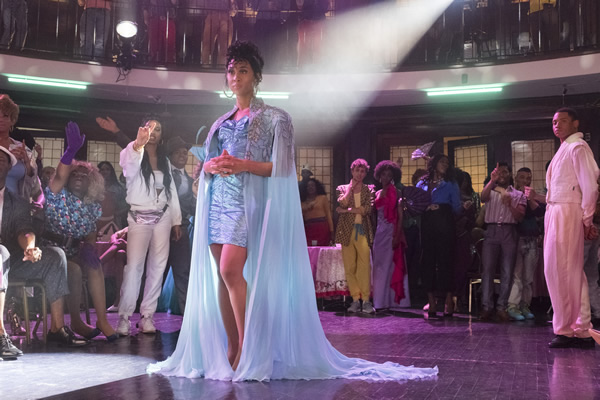
The groundbreaking FX series “Pose,” wrapped in June and was lauded for being the first show to center on trans women of color and cast trans actors in its roles.
The show, which depicted New York City drag ballroom culture of the ’80s and ’90s, only ran for three seasons (26 episodes) but followed the characters over the course of a decade.
Created by Steven Canals, Brad Falchuk and Ryan Murphy, the New York Times called the show “a celebration, a juicy soap and one of TV’s most kinetic and dance-intensive shows.”
Star Billy Porter told the Hollywood Reporter in May he’s been HIV-positive since 2007.
In September, Mj Rodriguez, who plays Blanca, was the first trans actor to receive an Emmy nomination.
#4: JoJo makes ‘Dancing’ history
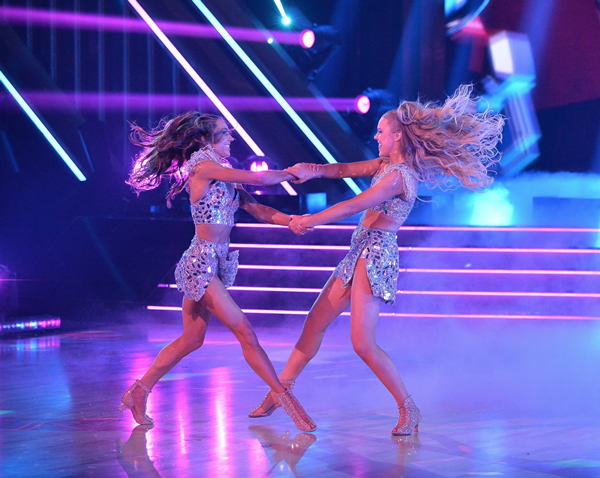
YouTuber JoJo Siwa, 18, one of Time’s “most influential people in the world” last year, came out as pan (she’s also comfortable with “queer” and “gay,” she said) in January.
In September, the dancer/singer made history on the 30th season of “Dancing With the Stars” as the first contestant to compete with a same-sex partner. She and Jenna Johnson came in second.
#3: Marvel depicts gay superhero
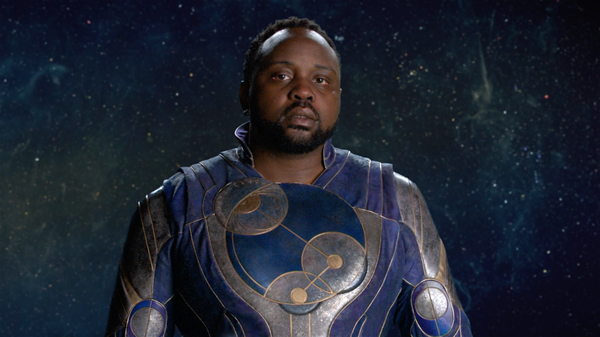
“Eternals,” the 26th movie in the Marvel Cinematic Universe, was released in November, features the franchise’s first LGBTQ superheroes with Phastos (Brian Tyree Henry), a genius inventor, who’s married to Ben (Haaz Sleiman) and father of Jack. The couple even gets an onscreen kiss.
Though the movie itself drew mixed reviews but solid box office, the inclusion was widely praised.
“Seeing a powerful gay superhero kiss his husband and feeling the reaction in that theater was a real-life example of why it is important for our stories to be told – especially in films that travel to big cities and small towns around the world,” Variety noted.
Several countries in the Middle East — Saudi Arabia, Kuwait, et. al. — denied release; others only agreed to a version that edited the love scenes.
“It made these Arab countries look so ignorant and pathetic,” Sleiman told Variety. “I have no respect for those governments.”
#2: Colton Underwood comes out — and it gets messy

The 29-year-old former NFL linebacker, whose alleged virginity gave him a novel angle on “The Bachelor” two years ago, came out in April on a “Good Morning America” interview. This month, a six-episode reality show dubbed “Coming Out Colton” arrived on Netflix in which he comes out to family and friends and learns gay culture.
In November, an online petition with more than 35,000 signatures asked Netflix to cancel the series because of stalking and harassment allegations that Underwood’s ex-girlfriend, Cassie Randolph (his choice on “The Bachelor,” though they didn’t end up marrying), claimed in a 2020 restraining order. The order was dropped, but the incident as well as the docuseries raised gay eyebrows.
“To some, that appears more like a monetized career move than an unvarnished emotional reckoning,” the New York Times wrote.
#1: Lil Nas X scores big with ‘Montero’
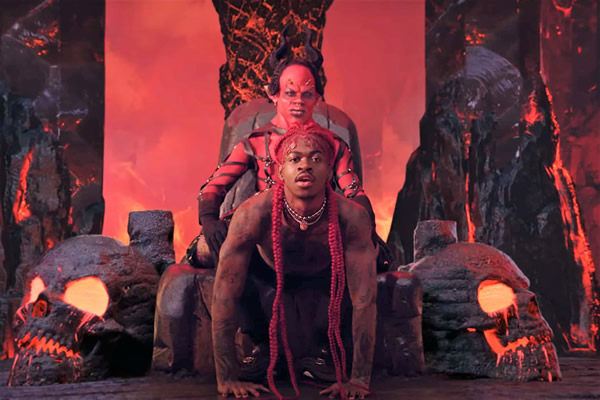
Out rapper Lil Nas X proved he’s not a one-hit wonder when his single “Montero (Call Me By Your Name)” debuted atop the Billboard Hot 100 in April.
Its video, which depicts the artist giving Satan a gay lap dance, won “Video of the Year” at the MTV Video Music Awards and People’s Choice Awards and three Grammys are pending.
The accompanying album, “Montero,” dropped in September at No. 2 to solid reviews and featured two other Hot 100 top-10 hits.
Nas shot to fame in 2018 when his song “Old Town Road” became the longest-charting No. 1 song in Hot 100 history.
Out & About
Plan your wedding the LGBTQ way
Washington D.C. LGBTQ+ Wedding Expo scheduled for Sunday

Rainbow Wedding Network will host “Washington D.C. LGBTQ+ Wedding Expo” on Sunday, March 1 at 12:30 p.m.
Guests can meet and mingle with a curated selection of LGBTQ-welcoming wedding professionals from across the region, each ready to help bring your vision to life, and spend a beautiful afternoon exploring everything they need to create a celebration that reflects them.
There will be a relaxed, self-guided look at the Watergate’s spaces and amenities, savor signature cocktails and delicious tasting samples, and connect with other couples who are on the same journey.
Visit Eventbrite to reserve a spot.

Friday, February 27
Center Aging Monthly Luncheon With Yoga and Drag Bingo will be at 12 p.m. at the DC Center for the LGBT Community. Email Mac at [email protected] if you require ASL interpreter assistance, have any dietary restrictions, or questions about this event.
Go Gay DC will host “LGBTQ+ Community Happy Hour Meetup” at 7 p.m. at Freddie’s Beach Bar and Restaurant. This is a chance to relax, make new friends, and enjoy happy hour specials at this classic retro venue. Attendance is free and more details are available on Eventbrite.
Trans Discussion Group will be at 7 p.m. on Zoom. This group is intended to provide an emotionally and physically safe space for trans people and those who may be questioning their gender identity/expression to join together in community and learn from one another. For more details, email [email protected].
Saturday, February 28
Go Gay DC will host “LGBTQ+ Community Brunch” at 11 a.m. at Freddie’s Beach Bar & Restaurant. This fun weekly event brings the DMV area LGBTQ+ community, including allies, together for delicious food and conversation. Attendance is free and more details are available on Eventbrite.
The DC Center for the LGBT Community will host “Sunday Supper on Saturday” at 2 p.m. It’s more than just an event; it’s an opportunity to step away from the busyness of life and invest in something meaningful, and enjoy delicious food, genuine laughter, and conversations that spark connection and inspiration. For more details, visit the Center’s website.
Black Lesbian Support Group will be at 1 p.m. on Zoom. This is a peer-led support group devoted to the joys and challenges of being a Black lesbian. You do not need to be a member of the Beta Kappa Chapter or the Beta Phi Omega Sorority in order to join, but they do ask that you either identify as a lesbian or are questioning that aspect of your identity.Send an email to [email protected] to receive the zoom link.
Sunday, March 1
LGBTQ+ Community Coffee and Conversation will be at 12 p.m. at As You Are. This event is for people looking to make more friends and meaningful connections in the LGBTQ community. Attendance is free and more details are available on Eventbrite.
Monday, March 2
“Center Aging: Monday Coffee Klatch” will be at 10 a.m. on Zoom. This is a social hour for older LGBTQ+ adults. Guests are encouraged to bring a beverage of choice. For more information, contact Adam ([email protected]).
Tuesday, March 3
Universal Pride Meeting will be at 7 p.m. on Zoom. This group seeks to support, educate, empower, and create change for people with disabilities. For more details, email [email protected].
Wednesday, March 4
Job Club will be at 6 p.m. on Zoom upon request. This is a weekly job support program to help job entrants and seekers, including the long-term unemployed, improve self-confidence, motivation, resilience and productivity for effective job searches and networking — allowing participants to move away from being merely “applicants” toward being “candidates.” For more information, email [email protected] or visit www.thedccenter.org/careers.
Center Aging Women’s Social and Discussion Group will be at 6 p.m. on Zoom. This group is a place where older LGBTQ+ women can meet and socialize with one another. There will be discussion, activities, and a chance for guests to share what they want future events to include. For more information, email [email protected].
Thursday, March 5
The DC Center’s Fresh Produce Program will be held all day at the DC Center for the LGBT Community. People will be informed on Wednesday at 5 p.m. if they are picked to receive a produce box. No proof of residency or income is required. For more information, email [email protected] or call 202-682-2245.
Virtual Yoga Class will be at 7 p.m. on Zoom. This free weekly class is a combination of yoga, breathwork and meditation that allows LGBTQ+ community members to continue their healing journey with somatic and mindfulness practices. For more details, visit the DC Center’s website.
a&e features
Transmission DC breathes new life into a storied sound space
A fresh home for boundary-pushing culture on H Street

Late last year, phoenix-style, a fresh home for boundary-pushing culture arose on the H Street corridor. Transmission DC – a queer, trans, and POC-owned, operated, and centered community-focused venue – powered on in the former home to the Rock & Roll Hotel (famously, not a hotel, but very much rock & roll). Transmission (1353 H St., N.E.) arrives secure in its mandate – or even birthright – to provide a place to celebrate creativity and music through a lens of inclusivity and respect.
Transmission’s team brings experience, but also representation. Owners/partners Kabir Khanna (who is also programming director), Katii B, Ellie McDyre, and Kelli Kerrigan together previously managed 618 productions, a venue in Chinatown, crafting “some of D.C.’s freakiest parties, raves, and mosh pits” they note.
They packed up operations last fall to a space curated specifically for D.C.’s underground music and culture scene, building their efforts in Chinatown to bring in more fans in queer and POC circles.
Transmission, Khanna points out, is built on DIY values. In the music scene, DIY means that promoters and organizers – often disconnected from the mainstream and part of marginalized communities – build shows and programs collaboratively, but independently from institutions, supporting each other as smaller, independent venues close. Here, Transmission aims to ensure that those putting together these underground inclusive shows have a more permanent and stable home, can have access to resources, and can provide more sustainable income to artists. “We’re trying to get more people to support and enjoy the music, and also give artists and organizers within the DIY community more structure and a larger cut,” says Khanna.
Khanna also notes that Transmission operates “under the principles of safety, inclusivity, and respect.” McDyre added that even at venues that claim inclusivity, that statement might not take place in practice. We’re “not just pitting up a rainbow flag,” says McDyre, but as some of the owners are trans and POC, audiences can see themselves reflected at the top.
Much like the DIY nature of the music community, the Transmission owners brought a DIY ethos to turning around their space.
In March 2020 – the height of COVID lockdowns – Rock & Roll Hotel suddenly shuttered, though not due to the pandemic; instead, the venue claimed that decreasing sales and increasing competition led to the closure. For 14 years, it was the central spot for cheap beer and lesser-known and celebrated acts. The space stood vacant for more than five years, until Transmission turned the power back on.
“When we got into the space, it was effectively abandoned for years,” says Khanna. “There was a ton of mold, and paint primer covering all surfaces. It was nearly falling apart.” Khanna noted that many music venues like this one, regardless of how well it was maintained, “get the shit kicked out of it,” given the nature of shows. The team called in mold removal contractors, ripped up most of the floorboards, and started fresh.
Transmission’s first floor is styled as a stripped-down black box: the better to take in the music. “It’s minimal on purpose to act as a canvas for set design and music,” without a specific aesthetic, says Khanna. Moving upstairs, the second floor has been opened up, removing some walls, and now has a larger dance area than the first floor. Beyond the first two performance levels, and a holdover from Rock & Roll Hotel, is the rooftop. Though without a stage, the rooftop space is filled with murals splashed across the walls, with a full bar. Transmission’s current capacity is 496, but the team is looking to grow that number. Transmission will also leverage the full kitchen that Rock & Roll Hotel operated, bringing in Third Hand Kitchen to offer a variety of food, including vegan and vegetarian options.
Khanna pointed out an upcoming show reflective of Transmission’s inclusive ethos: Black Techo Matters on Feb. 27. The event is set to be “a dynamic, collaborative night of underground electronic music celebrating Black History Month.” Khanna says that techno came from Black music origins, and this event will celebrate this genesis with a host of artists, including DJ Stingray 313, Carlos Souffront, and Femanyst.





